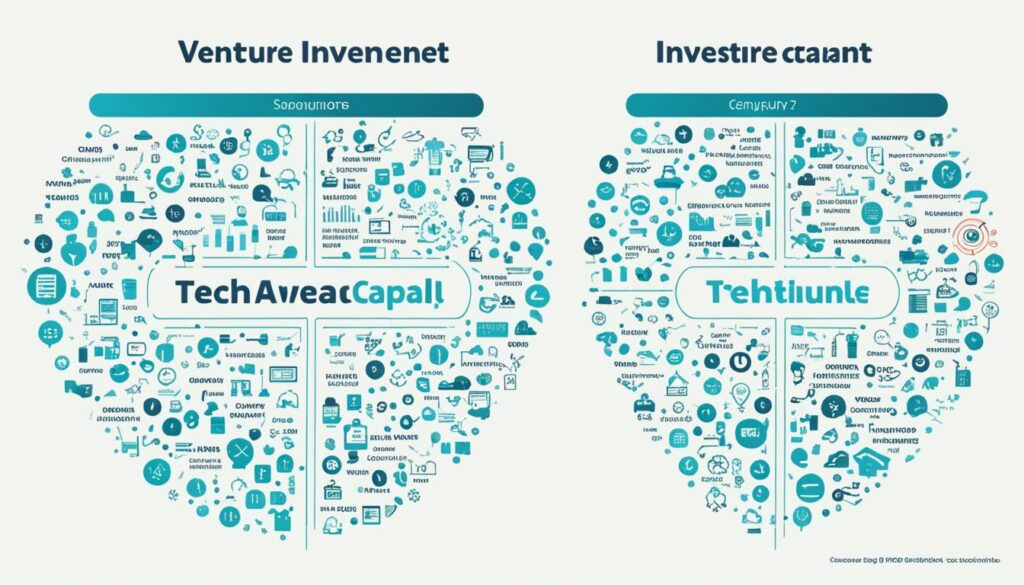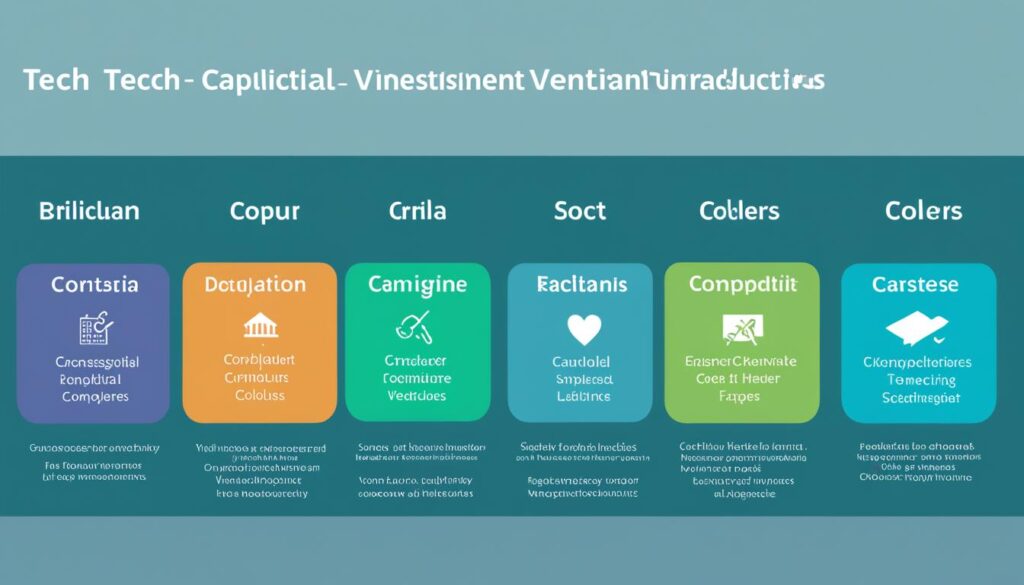Venture capital (VC) is key in helping startups and new ideas get off the ground. It works differently in the technology and healthcare fields, though. This piece delves into how VC approaches, picks, and supports startups differ in the tech and healthcare worlds.
Ever thought about why some new businesses find it easy to get VC funds? It’s because the tech and healthcare fields are not the same in the eyes of VC investors. Understanding the unique aspects of each sector can benefit those aiming to get or invest in VC funds.
Key Takeaways
- Venture capital investments in tech and healthcare are very different and have specific criteria.
- Tech startups often get VC funds quickly because they can grow fast and be big. Compare this to healthcare startups that must go through more steps and face rules.
- Venture capitalists are more willing to take risks and wait longer for returns in technology than in healthcare.
- Rules and regulations are a big deal for VC in healthcare, not so much in technology.
- How and when VC funds are given, and how companies are valued, changes depending on whether they are tech or healthcare.
Understanding Venture Capital
Venture capital is vital for startup companies and small businesses with big growth potential. It involves investors giving capital to these ventures. In return, they get an equity stake.
What is Venture Capital?
Venture capital is for early-stage companies or those with bold, new ideas. These firms often can’t get bank loans. So, venture capital is key for their growth.
The Role of Venture Capitalists
Venture capitalists (VCs) are key in the startup world. They check out possible investments, provide funds, and give advice. They also bring their skills, contacts, and resources to help the startups they choose.
Venture capitalists support innovation and job creation. They aim to earn big if the startups they choose do well.
The Tech Industry and Venture Capital

The tech industry is a big deal for venture capital. It attracts investors looking for fast growth and big changes. Startups in tech have something special that makes them stand out to venture capitalists.
Characteristics of Tech Startups
Tech startups grow fast by using new technologies and ways of doing business. They have the power to change whole industries. This is why venture capitalists are interested in them.
Risk and Return in Tech Investments
Venture capitalists in tech take on more risk. They want to invest in companies that could make a lot of money. The tech field offers many chances for big changes, but it also has a higher risk of failure.
Healthcare Ventures and Venture Capital

Investing in healthcare is different from tech. This is because healthcare ventures take a long time to develop. They also need to go through many safety tests and clinical trials. Because of this, healthcare investments can be riskier and need more money compared to tech investments.
Unique Challenges in Healthcare
Venture capitalists in healthcare face tough obstacles. They deal with long waits and many rules. For example, bringing a new medicine to market takes a longer time than a new app.
This is because medicines go through many tests and approvals. So, people who invest in healthcare need to know these rules well.
Healthcare products must also prove they work and are safe in big clinical trials. But these trials can cost a lot and take a long time to finish. This means healthcare ventures might not make a profit for a while.
Still, the healthcare field is a great place for investment. Especially in biotech, medical devices, and digital health. Investors who understand these challenges can find big success. They just need to be ready for a longer wait to see their investments pay off.
How is venture capital different in tech vs healthcare

Venture capital (VC) investments vary a lot between the tech and healthcare worlds. This is seen in how long they invest for, their bravery in taking risks, and how they plan to get their money back. These differences have a big impact on how VC works in these sectors.
Investment Horizon
The tech industry moves quickly, with startups reaching goals like going public or getting bought fast. This makes it easier for venture capitalists to see returns soon. But, in healthcare, things move slower because of longer development times and deep regulatory processes. This means VCs have to wait longer to see big returns.
Risk Appetite
Tech venture capitalists are often okay with big risks. They want to find the next big thing. They might invest in things that could either make huge profits or fail completely. Healthcare VCs, on the other hand, are more careful. They know healthcare is full of risks and rules. They wait for safer bets.
Exit Strategies
When it comes to exit strategies, the tech and healthcare sectors are different too. Tech companies can achieve big wins or be sold sooner, letting VCs pull their money out early. Things move slower in healthcare. This area needs more time for things like getting approval for new drugs. This means VCs might need to wait longer for their investments to pay off.
The unique differences in how VCs handle tech and healthcare investments show the special steps they need to take. Whether it’s dealing with long waits in healthcare or the fast pace of tech, VCs have to be ready for anything.
Regulatory Considerations

Venture capital investments in tech differ from those in healthcare due to regulations. The tech industry has its rules, as does healthcare, but they’re not the same. Complexity and effects on startups vary broadly between the two.
Tech Industry Regulations
Tech has rules like data privacy, consumer protection, and antitrust laws. But, these are often simpler than healthcare’s rules. This means tech startups might grow faster. They can focus on getting bigger and reaching events like IPOs or acquisitions quickly because of this.
Healthcare Industry Regulations
Healthcare is tightly regulated, especially in drug and medical device areas. This leads to more rules and hurdles for new healthcare businesses. Venture capitalists in healthcare need to keep a close eye on these regulations. They must help their invested companies deal with the rules effectively.
The gap between tech and healthcare’s regulatory challenges shapes investment and risk strategies. It’s key for entrepreneurs and investors to grasp these differences. This understanding helps in navigating the diverse worlds of venture capital.
Funding Stages

In the tech world, venture capitalists usually jump in early to fund new ideas. They help startups build new tech and business ways. This help is key for tech companies to grow fast. But, in healthcare, startups need big money for developing drugs. They need cash for clinical tests and getting the green light from regulators. So, healthcare venture capitalists often help more when a startup is further along.
Early-Stage Funding in Tech
Tech startups get a lot of love from early-stage venture capital funding. Investors here are up for the risks for big rewards. This funding is super important for tech companies. It helps them innovate, prove their worth, and speed up to get customers. Thanks to this support, tech firms with bold ideas can really take off.
Early-Stage Funding in Healthcare
The healthcare scene asks for bigger checks early on. Startups here need more cash for drug work and tests. Venture capitalists in healthcare tend to wait a bit. They join in when a startup has shown good progress and is nearly ready to win in the market. The slow start funding wise shows the healthcare field is tougher and riskier.
Investment Criteria

VCs in the tech and healthcare fields look at investments differently. This knowledge is gold for business owners looking for cash and investors wanting to put their money in the right place.
Tech Venture Investment Criteria
Tech VCs love startups that can grow fast and big. They are interested in new tech that could change the game. For them, a smart team, new technology, and a big market are key. They want to see a business that can really take off and lead its market.
Healthcare Venture Investment Criteria
Healthcare VCs are more into solid science and future market success. They focus on getting through tough rules and making things that people will always need. These VCs care a lot about making steady profits over time.
Due Diligence Process

The venture capital due diligence process is a key step before making an investment. This is true no matter the industry involved. However, the focus can be different between tech and healthcare startups. For tech startups, investors may check on the technology’s chances of success and the market competition. They also look at how well the team can put their plan into action. In the healthcare field, the focus is often on the science’s robustness, the steps needed for approval, and if it will be paid for by healthcare providers.
| Due Diligence Focus Areas | Tech Startups | Healthcare Startups |
|---|---|---|
| Technology Feasibility | Deeper Emphasis | Less Emphasis |
| Competitive Landscape | Deeper Emphasis | Moderate Emphasis |
| Founding Team Capabilities | Deeper Emphasis | Deeper Emphasis |
| Scientific Data Strength | Moderate Emphasis | Deeper Emphasis |
| Regulatory Pathway | Moderate Emphasis | Deeper Emphasis |
| Reimbursement Potential | Less Emphasis | Deeper Emphasis |
The due diligence process might last from a week to several months. It’s shorter for early-stage startups and longer for established ones. Investors look closely at the startup’s team, including their past successes and expertise. They examine the potential market, its size, growth, and trends. They also consider the product, looking at its uniqueness, quality, and future success. How well the company is doing (its traction) is also very important. This includes its customer base, sales, and future growth.
Valuation Methods

Valuation methods for tech and healthcare ventures are quite different. Valuing tech startups looks at fast growth, market size, and scalable potential. On the other hand, valuing healthcare firms considers product pipeline strength, approval prospects, and commercial opportunity.
Tech startups focus on quick growth and big opportunities. That’s why their valuations look at future revenue and growth in users. Health companies, however, deal with more regulations and longer paths to success. Their value is often linked to their product’s quality and its chances in the market.
Investment Syndicates

Venture capital investors often form groups to support a startup. In the tech and healthcare fields, how these groups work can be very different.
Tech Investment Syndicates
Tech syndicates usually mix early and later-stage investors. Each brings unique skills and contacts. They aim to help startups with advice, industry ties, and key business insights. This ‘helping hand’ is crafted to guide new tech businesses through their journeys.
Healthcare Investment Syndicates
In healthcare, you’ll see more of a focus on one area – life sciences. These investors understand the big picture and the need for more time and money in their sector. Their shared knowledge and big investments are vital for healthcare startups. They help them face and tackle the industry’s specific hurdles.
| Tech Investment Syndicates | Healthcare Investment Syndicates |
|---|---|
| Mix of early-stage and later-stage investors | Specialized group of investors with deep domain knowledge in life sciences |
| Offer expertise, industry connections, and strategic guidance | Commit larger amounts of capital to support longer development timelines and higher regulatory hurdles |
| Provide well-rounded support to navigate the fast-paced tech landscape | Crucial in helping healthcare startups overcome unique industry challenges |
Conclusion
In venture capital, the tech and healthcare sectors stand out for different reasons. Tech startups catch the eye with their quick growth and ability to change the game. On the other hand, healthcare ventures have a rougher road. They take longer to develop, face more rules, and require careful valuation.
Knowing the key differences between these sectors is essential. It helps business-minded people understand how to succeed in their area. This knowledge can help entrepreneurs, investors, and more make the most of innovation and growth.
As venture capital keeps moving, being able to meet the needs of tech and healthcare is crucial. Success for both investors and startups rests on how well they tackle these unique challenges. By working with these differences and highlighting their strengths, the venture capital world can lead to big changes. They can boldly shape the future in these exciting fields.
